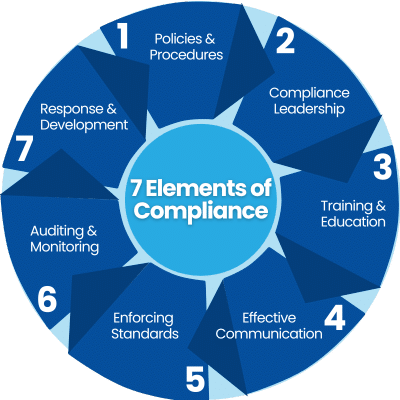
One of the most important pieces of guidance that the Department of Health and Human Services (HHS) Office of Inspector General (OIG) has put out in regard to healthcare compliance is The Seven Elements of an Effective Compliance Program. On November 6, 2023, the OIG released an updated General Compliance Program Guidance (GCPG) manual, the first significant update in 15 years. The updates made provide clearer guidance on what an effective compliance program is, and how healthcare organizations can implement them.
Since the OIG 7 elements of an effective compliance program was first released, OCR enforcement for compliance violations has increased significantly.
The OIG seven elements of an effective compliance program represent the minimum necessary requirements that healthcare organizations must have in place to address compliance standards.
You might be wondering how to build a compliance program or how to develop a compliance framework. The OIG 7 Elements of an Effective Compliance Program are as follows:
- Written Policies and Procedures
- Compliance Leadership and Oversight
- Training and Education
- Effective Lines of Communication with the Compliance Officer and Disclosure Program
- Enforcing Standards: Consequences and Incentives
- Risk Assessment, Auditing, and Monitoring
- Responding to Detected Offenses and Developing Corrective Action Initiatives
Each of the Seven Elements requires robust, organization-wide enforcement and documentation. Many compliance standards require annual review, as well.
Healthcare compliance programs are most successful when they’re integrated into the management of your practice–creating an effective corporate compliance program within your practice is your best bet to avoid breaches and fines!
Written Policies and Procedures
Policies and procedures outline how your organization and employees are expected to behave. In healthcare, policies and procedures are essential for several reasons. They ensure that patient information is handled correctly and secured, help to create a safe work environment for employees while protecting patients, and ensure ethical billing practices by preventing fraud, waste, and abuse.
Compliance Leadership and Oversight
Compliance leadership and oversight, through the designation of a Compliance Officer and Compliance Committee, ensures that your organization follows policies, procedures, and standards of conduct. They are also responsible for handling responses to reported breaches or incidents, and implementing corrective actions.
Training and Education
All healthcare employees must receive compliance training. Employee training protects both employees and patients. Without effective training, your organization is vulnerable to breaches and incidents, and staff and patients could experience an injury or illness that would otherwise have been prevented.
Effective Lines of Communication with the Compliance Officer and Disclosure Program
Effectively communicating compliance obligations to staff members is essential. The OIG promotes transparency to ensure employees can confidentially communicate compliance concerns to authority figures. Effective communication also ensures that employees are aware of safety expectations, reporting procedures, and that a mechanism exists to report deviations in safety and compliance confidentially.
Enforcing Standards: Consequences and Incentives
Employees must be aware of the consequences of failing to follow compliance guidelines. Without well-publicized disciplinary guidelines, enforcing compliance can be difficult and lead to unequal treatment of employees should a violation occur.
Risk Assessment, Auditing, and Monitoring
Ensuring employees are following compliance standards prevents violations and costly fines. Risk assessments, auditing, and monitoring of compliance efforts are also significant in compliance. Risk assessments and auditing identify where your policies, procedures, or standards of conduct are lacking. When there is a change in your business practices, conducting a risk assessment is essential to identify new areas of vulnerability. Monitoring compliance efforts also ensures that your ongoing compliance efforts are effective.
Responding to Detected Offenses and Developing Corrective Action Initiatives
There are standards for reporting and responding to compliance incidents. Under HIPAA, breaches of patient information must be reported promptly. A breach affecting 500 or more patients must be reported within 60 days of discovery to the Office for Civil Rights (OCR). Breaches that affect less than 500 patients should be noted throughout the year and reported by March 1st of the following year. In both cases, patients must be informed within 60 days of discovery.
Under OSHA, injury and illness reporting requirements differ based on the severity of the incident. Some injuries must be reported immediately, whereas others give organizations a grace period to do so. Fraud, waste, and abuse must also be reported. When organizations fail to meet ethical billing practices, fines can be costly and can lead to being added to the OIG exclusion list.
About Compliancy Group
Compliancy Group gives healthcare professionals the tools they need to implement an effective compliance program. Whether you’re a seasoned Compliance Officer or an Office Manager, our healthcare compliance software has something for you.
Our templated policies and procedures can be customized for your organization, or used out of the box. Guided risk assessment questionnaires make it easy to identify your areas of risk, and automatically produce corrective action plans based of their results.
You also get a complete toolset for efficiently educating your entire workforce – from new-hire employee training to refresher training. All you have to do is add employees to the platform, and they’re automatically assigned all relevant training modules. Proof of completed employee training is easily accessible from your compliance dashboard.
Worried about vendor contract management? We have you covered! Manage and monitor important vendor documents with ease using our software. Send documents and store them on your compliance dashboard for swift retrievable proof of your vendor due diligence.
Our software also supports anonymous incident reporting. You’ll get a complete set of ticketing, tracking, and analysis tools to expedite incident response and management. Easily identify organizational risks from incident reports to improve your compliance efforts and prevent future incidents.
With The Guard, healthcare professionals can focus on running their practice while keeping their patients’ data protected and secure.
Find out more about how Compliancy Group can help simplify your healthcare compliance today!








